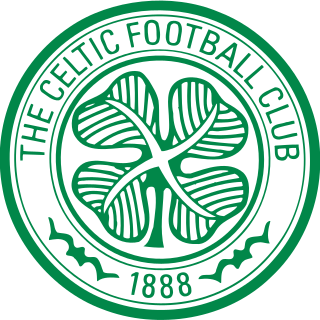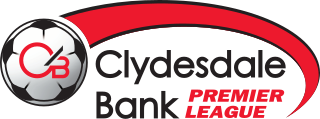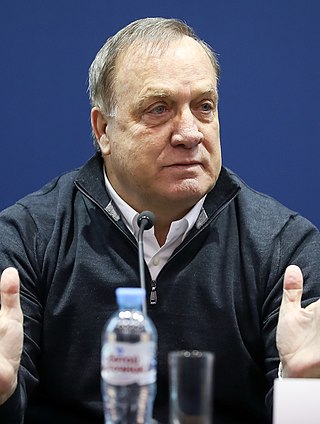
The Celtic Football Club, commonly known as Celtic, is a professional football club in Glasgow, Scotland. The team competes in the Scottish Premiership, the top division of Scottish football. The club was founded in 1887 with the purpose of alleviating poverty in the Irish–Scots population in the city's East End area. They played their first match in May 1888, a friendly match against Rangers which Celtic won 5–2. Celtic established themselves within Scottish football, winning six successive league titles during the first decade of the 20th century. The club enjoyed their greatest successes during the 1960s and 70s under Jock Stein, when they won nine consecutive league titles and the 1967 European Cup. Celtic have played in green and white throughout their history, adopting in 1903 the hoops that have been used ever since.

Rangers Football Club is a professional football club in Glasgow, Scotland. The team competes in the Scottish Premiership, the top division of Scottish football. The club is often referred to as Glasgow Rangers, though this has never been its official name. The fourth-oldest football club in Scotland, Rangers was founded by four teenage boys as they walked through West End Park in March 1872 where they discussed the idea of forming a football club, and played its first match against the now defunct Callander at the Fleshers' Haugh area of Glasgow Green in May of the same year. Rangers' home ground, Ibrox Stadium, designed by stadium architect Archibald Leitch and opened in 1929, is a Category B listed building and the third-largest football stadium in Scotland. The club has always played in royal blue shirts.

The Scottish Premier League was the top-level league competition for professional football clubs in Scotland. The league was founded in 1998, when it broke away from the Scottish Football League (SFL). It was abolished in 2013, when the SPL and SFL merged to form the new Scottish Professional Football League, with its top division being known as the Scottish Premiership. A total of 19 clubs competed in the SPL, but only the Old Firm clubs of Glasgow—Celtic and Rangers—won the league championship.

Falkirk Football Club is a Scottish professional association football club based in the town of Falkirk. The club was founded in 1876 and competes in the Scottish Championship, the second tier of Scottish football, as a member of the Scottish Professional Football League. The club was elected to the Second Division of the Scottish Football League in 1902–03, was promoted to the First Division after two seasons and achieved its highest league position in the early 1900s when it was runner-up to Celtic in 1907–08 and 1909–10. The football club was registered as a Limited Liability Company in April 1905 – Falkirk Football & Athletic Club Ltd.

Dirk Nicolaas "Dick" Advocaat is a Dutch former football player and coach. He is the current manager of the Curaçao national football team.

The 2005–06 season was the 109th season of competitive football in Scotland.

Johannes Vennegoor of Hesselink is a Dutch former professional footballer who played as a striker. He played in the Eredivisie for Twente and PSV, in the Scottish Premier League for Celtic, in the Premier League for Hull City, in the Austrian Football Bundesliga for Rapid Vienna and the Netherlands national team.

Allan James McGregor is a Scottish former professional footballer who played as a goalkeeper. McGregor has previously played for Rangers, St Johnstone, Dunfermline Athletic, Turkish team Beşiktaş, English club Hull City and Welsh side Cardiff City, and made 42 international appearances for Scotland.
The 2002–03 Scottish Premier League was the fifth season of the Scottish Premier League (SPL), the top level of football in Scotland. It began on 3 August 2002 and concluded on 25 May 2003.
The 2001–2002 Scottish Premier League was the fourth season of the Scottish Premier League, the top level of football in Scotland. It began on 28 July 2001 and concluded on 12 May 2002.
The 2000–01 Scottish Premier League was the third season of the Scottish Premier League, the top level of football in Scotland. It began on 29 July 2000 and concluded on 20 May 2001.

Hendrikus Jacobus Maria "Harry" van Raaij was a Dutch functionary, who served as the chairman of PSV Eindhoven, a Dutch sports club, between 1996 and 2004.
The 2007–08 Scottish Premier League season was the tenth season of the Scottish Premier League. It began on 4 August 2007 and was originally due to end on 18 May 2008. Due to the death of Phil O'Donnell and extremely poor weather causing the postponement of fixtures during the winter, as well as a backlog of Rangers fixtures and their progression to the UEFA Cup Final, the SPL decided to move the final round of fixtures back four days to 22 May 2008. It was the first season under the sponsorship of the Clydesdale Bank.
The 1999–2000 season was the 120th season of competitive football by Rangers.
The 1998–99 Scottish Premier League season was the inaugural season of Scottish Premier League football, the top division of Scottish football. It began on 1 August 1998 and concluded on 23 May 1999.

Thomas Pauck Rogne is a Norwegian professional footballer who plays for Swedish club Helsingborgs IF as a centre-back. Rogne has also been capped for the Norway national team.

The 2010–11 season was the 114th season of competitive football in Scotland.

The 2011–12 season is the 115th season of competitive football in Scotland.

The 2012–13 season was the 116th season of competitive football in Scotland. The season began on 28 July 2012, with the start of the Challenge Cup.

The 2023–24 season is the 127th season of competitive football in Scotland. The domestic season began on 15 July with the first Scottish League Cup group stage matches, before the opening round of matches in the 2023–24 Scottish Premiership were played on 6 August.









